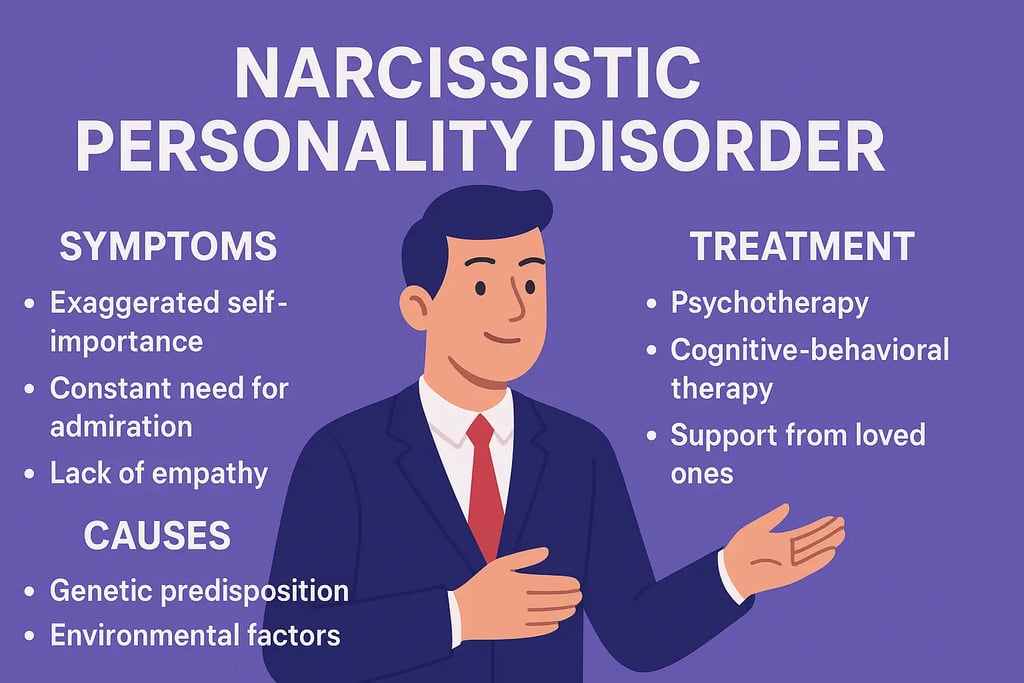Narcissistic Personality Disorder (NPD): Symptoms, Causes, and Treatment
Discover what Narcissistic Personality Disorder (NPD) is, including its key symptoms, causes, and effective treatment options. Learn how narcissism affects relationships and emotional health.


What Is Narcissistic Personality Disorder?
Narcissistic Personality Disorder (NPD) is a complex mental health condition marked by an exaggerated sense of self-importance, a constant need for admiration, and a lack of empathy toward others. According to the Diagnostic and Statistical Manual of Mental Disorders (DSM-5), NPD is diagnosed based on consistent behavioral patterns such as:
Overestimating one’s talents or achievements
Being preoccupied with fantasies of power, beauty, or success
Believing one is unique and can only be understood by special individuals
Exploiting relationships for personal gain
While many people may occasionally display narcissistic traits, NPD represents a chronic and deeply ingrained behavior pattern that interferes with daily life and relationships.
People with NPD often find it hard to form genuine emotional connections. Their relationships—whether with family, friends, or coworkers—tend to become strained, as others may feel undervalued, manipulated, or dismissed.
Studies estimate that NPD affects around 0.5%–1% of the global population. Although it’s less common than other personality disorders, its emotional and psychological impact can be severe. Individuals with NPD typically react negatively to criticism or perceived rejection, often responding with anger or defensiveness.
Understanding Narcissistic Personality Disorder is crucial—not just for those experiencing it but also for the people around them who may be affected by their behavior.
Causes of Narcissistic Personality Disorder
The exact causes of Narcissistic Personality Disorder are not fully understood, but research points to a combination of genetic, environmental, and psychological factors.
1. Genetic Factors
A family history of personality disorders, especially those related to narcissism, may increase the risk of developing NPD. Genetic predispositions influence certain personality traits—such as temperament and emotional regulation—that can shape narcissistic tendencies.
2. Environmental Influences
Childhood experiences play a major role. Both excessive pampering and harsh criticism during early development can contribute to NPD.
Children who are overly praised may develop a sense of entitlement.
Conversely, those who face neglect or severe criticism may overcompensate by developing an inflated self-image to mask feelings of inadequacy.
3. Cultural and Social Factors
Cultural values emphasizing individualism and achievement can also encourage narcissistic traits. In societies where success and image are highly valued, individuals may internalize the belief that self-worth depends on recognition and admiration from others.
In summary, NPD arises from a blend of hereditary tendencies, early life experiences, and societal expectations. Recognizing these factors can help mental health professionals develop more personalized treatment approaches.
Symptoms of Narcissistic Personality Disorder
The symptoms of NPD vary in intensity but generally affect how individuals think, feel, and relate to others. Common symptoms include:
1. Exaggerated Self-Importance
People with NPD often overstate their talents or achievements and expect to be recognized as superior even without corresponding accomplishments.
2. Constant Need for Admiration
They crave validation and attention from others. When admiration is not forthcoming, they may feel deeply hurt, angry, or frustrated.
3. Lack of Empathy
A defining feature of NPD is an inability or unwillingness to understand others’ emotions. This lack of empathy often leads to manipulative or self-centered behavior.
4. Sense of Entitlement
Those with NPD believe they deserve special treatment and may become hostile or resentful when their expectations are not met.
5. Fragile Self-Esteem
Despite appearing confident, individuals with NPD often have low emotional resilience. Criticism or perceived rejection can easily damage their self-image, triggering defensive or aggressive reactions.
Because of these symptoms, individuals with NPD often face relationship challenges and emotional instability, making it essential to recognize early warning signs for effective intervention.
Treatment for Narcissistic Personality Disorder
Treating Narcissistic Personality Disorder requires patience, empathy, and specialized therapeutic approaches. While no medication specifically cures NPD, psychotherapy (talk therapy) has proven to be the most effective method.
1. Psychotherapy
Cognitive-Behavioral Therapy (CBT) helps individuals recognize and modify distorted thought patterns that fuel narcissistic behaviors. Through CBT, they can develop more balanced self-perceptions and healthier interpersonal skills.
Schema-Focused Therapy is another effective approach that helps uncover deep-rooted beliefs formed during childhood. By addressing these “schemas,” patients can gradually change how they relate to themselves and others.
2. Building Self-Awareness
Therapists work with patients to help them identify the impact of their actions on others, fostering empathy and emotional understanding—two areas where people with NPD often struggle.
3. Support from Family and Friends
Encouragement and understanding from loved ones can help individuals stay engaged in therapy. Support systems play a vital role in motivating patients to continue treatment and manage their emotional responses.
In conclusion, while Narcissistic Personality Disorder is challenging to treat, progress is possible. With consistent therapy, emotional support, and personal commitment, individuals with NPD can learn to build healthier relationships and achieve better emotional balance.
Key Takeaways
NPD is a long-term personality disorder characterized by grandiosity, need for admiration, and lack of empathy.
Causes include genetics, childhood environment, and cultural pressures.
Common symptoms include entitlement, manipulation, and hypersensitivity to criticism.
Effective treatment focuses on psychotherapy—especially CBT and schema therapy—with support from loved ones.
By increasing awareness of Narcissistic Personality Disorder, individuals and families can take proactive steps toward understanding and managing its impact on mental health and relationships.
